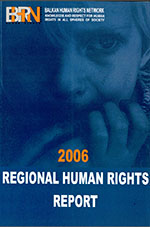Human Rights in Bulgaria 2006
Human Rights in Bulgaria 2006
Author(s): Genoveva TishevaSubject(s): Law, Constitution, Jurisprudence
Published by: Balkan Human Rights Network
Summary/Abstract: The report explores the experience of Bulgaria, which is a New EU Member State, in the field of the realization of the right to education, as well as the right to employment of persons from minorities. The achievements and shortcomings in the realization of these closely interrelated human rights and the practice of new institutions for protection of human rights, as the Commission for Protection from Discrimination and the National Ombudsman, are presented with the respective challenges, which could be of relevance to other Balkan countries. In addition to the Constitutional guarantees, Bulgaria has adhered to the main international instruments and policy documents on the right to education. Furthermore, as a full member of the EU since January 2007, Bulgaria has to align its educational system in view of the achievement of the goals and objectives of the Lisbon Strategy. The practice of the implementation of the lega:! standards and their translation into governmental action, though, show that they are still high and intangible standards. The mechanisms necessary for the implementation of the international standards and those of the Law on Protection from Discrimination in practice are still missing, despite the efforts and initiatives deployed mainly by the Ministry of Education and Science. The obstacles to implementation are also the result of the micro-economic trends and policies characterizing the Bulgarian transition and the resulting financial constraints. The final result of the reform in the education system was the economic exclusion of vulnerable groups with noticeable racial profile. Some of the main problems identified in the course of the study are: 1/ The integration of children and students from minorities, despite the strategies and other documents developed by the government, remains a severe human rights issue;.2/ Another serious issue is the social exclusion and multiple discrimination of Roma women and girls; 3/ The low economic status of the teachers in Bulgaria- with average wages less than 200 EURO per month Bulgaria falls among the countries with the lowest average wage for teachers in Europe; 4/ Comprehensive education on gender equality and for elimination of gender stereotypes is still missing. In the last year before the accession to the EU, along with the adopted legislation, programs and plans, the Government has made efforts for institutional changes in terms of integration of Roma in Bulgarian society. Although the data show some progress in the field, in order to speak about achievements, the sustainability of Roma employment as well as the perspectives for real career have to be further assessed. Unemployment remains one of the gravest problems for the Roma ethnos. In the regions with concentrated Roma population 65% to 75% of people are still out of work. The low level of education and professional training is the main contributing factor for unemployment and isolation.
Journal: Regional Human Rights Report
- Issue Year: 2006
- Issue No: 01
- Page Range: 84-120
- Page Count: 37
- Language: English

